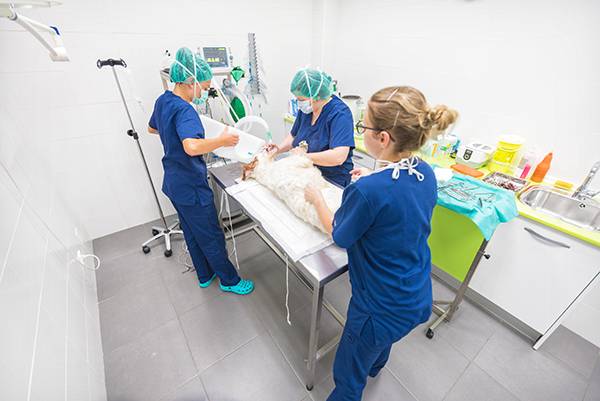If you love being around animals but don’t have the inclination to go to veterinary school, you can still have a job that can make a big difference in the life of ailing pets—as a veterinary assistant.
Veterinary assistants are an important part of the team at animal hospitals. They participate in surgeries, provide care to sick animals, and assist veterinarians by running lab tests. They also work alongside registered veterinary technicians, helping to care for hospitalized animals. Some veterinary assistants receive a certification, becoming Certified Veterinary Assistants (CVAs).
Unlike veterinary technicians, who are authorized to perform certain tasks without a veterinarian present, such as render emergency aid, take X-rays and suture wounds, veterinary assistants work under the direct supervision of a veterinarian or veterinary technician. They are permitted to perform jobs such as feeding, bathing and restraining patients. Veterinary assistants may also be tasked with cleaning exam and surgery rooms, and sterilizing equipment. Depending on the hospital setting, some are required to draw blood and collect urine samples from patients.
When you go to your veterinarian’s office with your pet, it is often a veterinary assistant who first greets you and your pet in the exam room. The veterinary assistant will often weigh your pet, take his temperature and ask you questions about your pet’s condition. Veterinary assistants also work behind the scenes at your veterinarian’s office, caring for hospitalized animals, and assisting veterinarians and veterinary technicians with various back office procedures.
In order to be happy working as a veterinary assistant, you must enjoy working closely with animals and dealing with veterinary issues. You must also be willing to take direction from registered veterinary technicians and veterinarians.
There are pro’s and con’s to being a veterinary assistant, just as with any job.
Pro’s
Veterinary assistants receive some important benefits:
- You will have the opportunity to work closely with dogs, cats and other animals on a daily basis.
- You will learn a lot about animal health care and veterinary medicine.
- If you like people, the regular contact you will have with the public is another benefit.
- You may have the option of being a full-time hospital staff member, and will receive benefits like health insurance and a 401k.
- You may be able to work part-time if you don’t want to work full time.
- You will be a valued member of a veterinary team.
- You will make a positive impact on sick patient and assist with lifesaving medicine.
Cons
There are some disadvantages to being a veterinary assistant.
- The salary you’ll make will be lower than that of a registered veterinary technician, sometimes not much higher than minimum wage. It will be considerably lower than the salary made by a veterinarian.
- You will have to deal with the unpleasant sights and smells that are a regular part of any veterinary practice.
- You will see pets that are sick, injured and dying, and will have to face the reality that a number of these patients just won’t make it. This can be very hard for someone who loves animals.
Should you choose to become a veterinary assistant despite the difficulties that can come with the job, you might discover the many benefits far outweigh the disadvantages.







